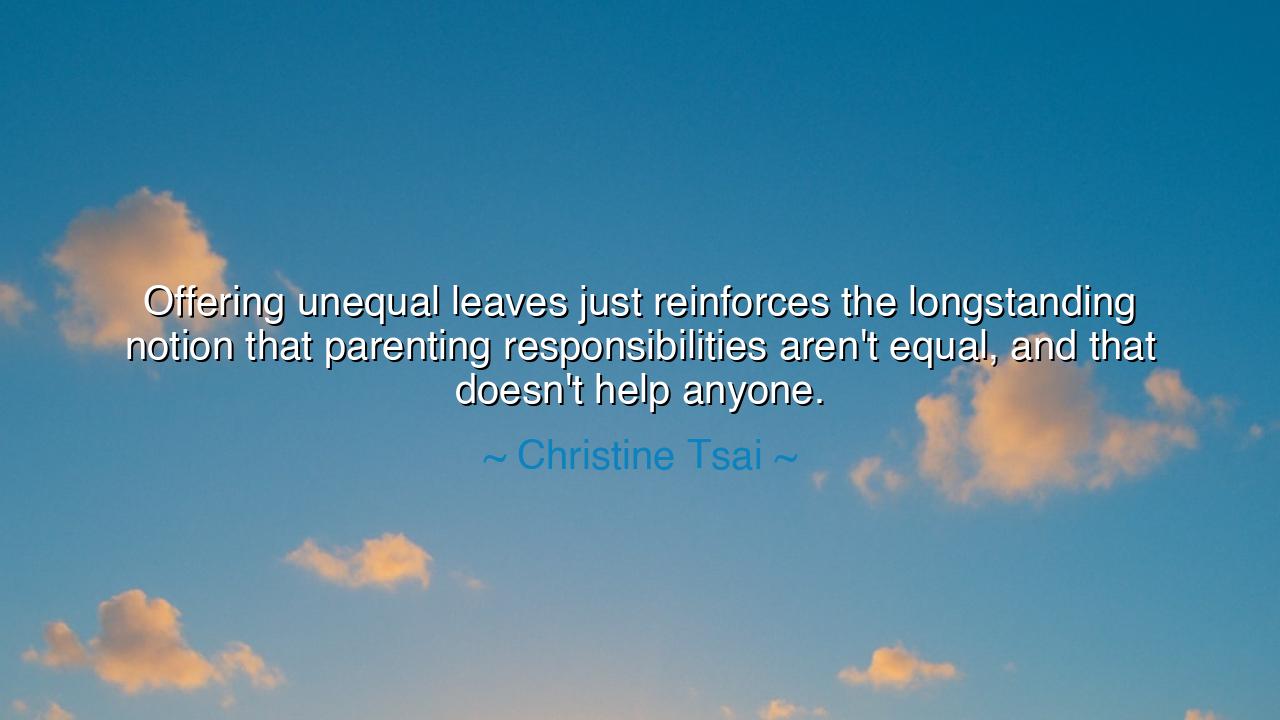
Offering unequal leaves just reinforces the longstanding notion
Offering unequal leaves just reinforces the longstanding notion that parenting responsibilities aren't equal, and that doesn't help anyone.






Hear the words of Christine Tsai, spoken with clarity and conviction: “Offering unequal leaves just reinforces the longstanding notion that parenting responsibilities aren’t equal, and that doesn’t help anyone.” These words cut to the heart of a truth that societies have long struggled to face—that the burdens and blessings of parenting have too often been unequally distributed, leaving one parent with the greater share of labor, and the other with the freedom to choose detachment. By naming this imbalance, Tsai calls us to a vision of justice within the family, for only when both parents are equally entrusted with responsibility can the child, the household, and indeed society itself flourish.
From the earliest days, the division of labor between mothers and fathers was not merely tradition but law, written into the customs of nations and enforced by culture. The mother was expected to nurture, to sacrifice, to bend her body and soul in service of the child, while the father was expected to provide, to command, and often to remain distant from the intimate daily care. Even when laws began to allow parental leave in modern times, they frequently reflected this ancient imbalance, granting more time to the mother and little to the father. Thus, the message remained the same: parenting is her duty, while his is optional.
But Tsai reveals that such unequal leaves do more than distribute time unfairly; they enshrine inequality in the very fabric of society. When one parent is absent by custom and the other is expected to shoulder the whole weight, a cycle is formed: workplaces assume mothers will be less committed to careers, fathers are excused from tender care, and children grow up believing that nurturing belongs only to women. This is not simply a private injustice, but a cultural wound, shaping generations with the lie that responsibility itself is gendered.
Consider the story of Sweden, a nation that once faced the same imbalance as others, but which chose to reform its laws to grant equal parental leave to mothers and fathers alike. What followed was a transformation: fathers became more present, mothers returned to work with dignity, and children grew up seeing both parents as nurturers. In such examples, we see the wisdom of Tsai’s words: equality in leave is not merely a bureaucratic matter, but a declaration that parenting is a shared calling. When this truth is honored, families grow stronger, workplaces more just, and societies more whole.
To ignore this, however, is to invite harm. Unequal responsibility breeds resentment between parents, exhaustion for one, and alienation for the other. It robs fathers of the chance to build early bonds with their children, and it robs mothers of the dignity of partnership. Worse still, it teaches the young that love itself can be unequal, and that labor can be divided unjustly without consequence. Tsai’s wisdom reveals that such patterns do not help anyone—not the parent who is overburdened, not the one who is estranged, and not the child who is caught in between.
The lesson, then, is clear: justice must begin in the household. If parents are to raise children who believe in fairness, they must first practice fairness themselves. Let every society, every workplace, and every family recognize that care is not a woman’s duty nor a man’s choice, but a human responsibility, shared equally. When parents stand together, shoulder to shoulder, the child sees a vision of balance that will shape their own life and the generations that follow.
Therefore, let all who hear these words take action: support equal leave, encourage shared care, and dismantle the chains of old notions that divide love into unequal halves. If you are a parent, step fully into the labor of nurture, whether mother or father. If you are a leader, create policies that honor balance. And if you are a citizen, remember that the strength of a nation begins in the justice of its families.
Thus Christine Tsai’s words, though spoken of policy, reach into the very heart of humanity. Unequal leaves are more than a workplace issue; they are symbols of how we value one another. And by choosing equality, we do not merely help mothers or fathers—we help everyone, for we build a world where love and responsibility walk hand in hand.






AAdministratorAdministrator
Welcome, honored guests. Please leave a comment, we will respond soon